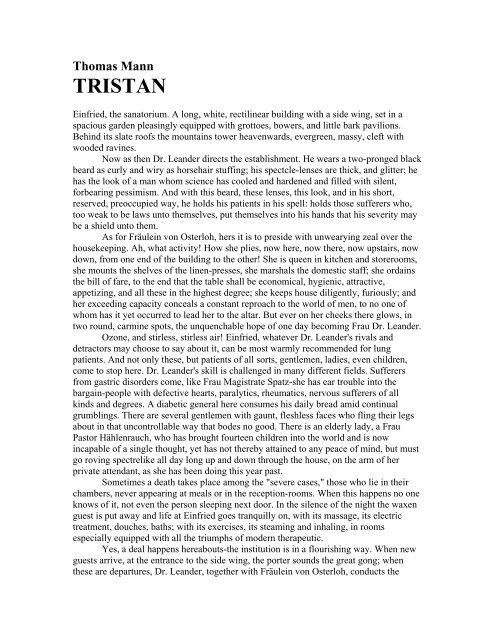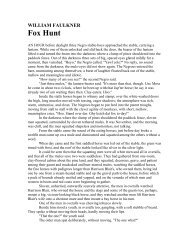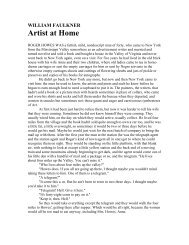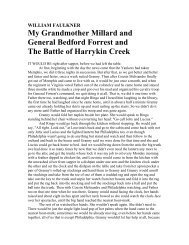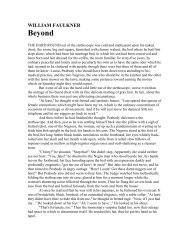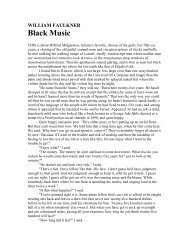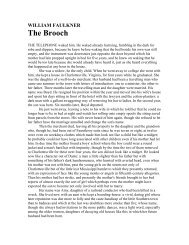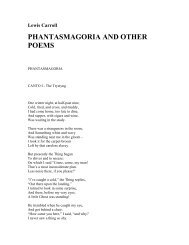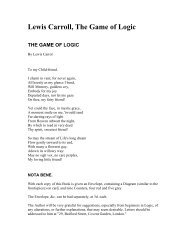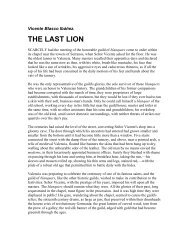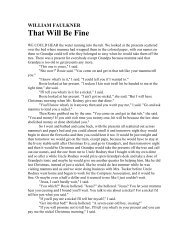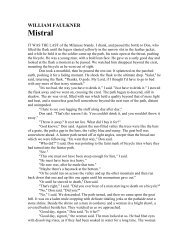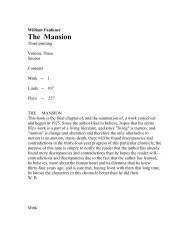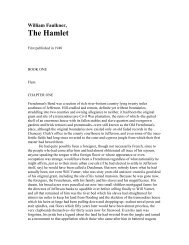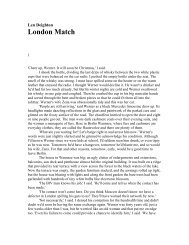Thomas Mann - TRISTAN - literature save 2
Thomas Mann - TRISTAN - literature save 2
Thomas Mann - TRISTAN - literature save 2
Create successful ePaper yourself
Turn your PDF publications into a flip-book with our unique Google optimized e-Paper software.
"Yes, that is remarkable," she said. "And when I try I can understand what youmean."Whereto he responded that it was not worth her taking any sort of trouble, andthey laughed together. Frau Spatz laughed too and found it remarkable in her turn, thoughshe did not say she understood it.The reception-room was spacious and beautiful. The high, white folding doorsthat led to the billiard-room were wide open, and the gentlemen with the rebellious legswere disporting themselves within, others as well. On the opposite side of the room aglass door gave on the broad veranda and the garden. Near the door stood a piano. At agreen-covered folding table the diabetic general was playing whist with some othergentlemen. Ladies sat reading or embroidering. The rooms were heated by an iron stove,but the chimney-piece, in the purest style, had coals pasted over with red paper tosimulate a fire, and chairs were drawn up invitingly."You are an early riser, Herr Spinell," said Herr Klöterjahn's wife. "Two or threetimes already I have chanced to see you leaving the house at half past seven in themorning.""An early riser? Ah, with a difference, madame, with a vast difference. The truthis, I rise early because I am such a late sleeper.""You really must explain yourself, Herr Spinell." Frau Spatz too said shedemanded an explanation."Well, if one is an early riser, one does not need to get up so early. Or so it seemsto me. The conscience, madame, is a bad business. I, and other people like me, work hardall our lives to swindle our consciences into feeling pleased and satisfied. We are fecklesscreatures, and aside from a few good hours we go around weighted down, sick and sorewith the knowledge of our own futility. We hate the useful; we know it is vulgar andunlovely, and we defend this position, as a man defends something that is absolutelynecessary to his existence. Yet all the while conscience is gnawing at us, to such anextent that we are simply one wound. Added to that, our whole inner life, our view of theworld, our way of working, is of a kind-its effect is frightfully unhealthy, undermining,irritating, and this only aggravates the situation. Well, then, there are certain littlecounter-irritants, without which we would most certainly not hold out. A kind ofdecorum, a hygienic regimen, for instance, becomes a necessity for some of us. To get upearly, to get up ghastly early, take a cold bath, and go out walking in a snowstorm-thatmay give us a sense of self-satisfaction that lasts as much as an hour. If I were to act outmy true character, I should be lying in bed late into the afternoon. My getting up early isall hypocrisy, believe me.""Why do you say that, Herr Spinell? On the contrary, I call it self-abnegation."Frau Spatz, too, called it self-abnegation."Hypocrisy or self-abnegation-call it what you like, madame. I have such ahideously downright nature-""Yes, that's it. Surely you torment yourself far too much.""Yes, madame, I torment myself a great deal."The fine weather continued. Rigid and spotless white the region lay, themountains, house and garden, in a windless air that was blinding clear and cast bluishshadows; and above it arched the spotless pale-blue sky, where myriads of bright partidesof glittering crystals seemed to dance. Herr Klöterjahn's wife felt tolerably well
Two weeks had passed since that conversation, yet he knew at once what shemeant, and his voice shook as he assured her that he would have seen the little crown asshe sat among her friends by the fountain-would have caught its fugitive gleam amongher locks.A few days later one of the guests chanced to make a polite inquiry after thehealth of little Anton. Herr Klöterjahn's wife gave a quick glance at Herr Spinell, whowas standing near, and answered in a perfunctory voice: "Thanks, how should he be? Heand my husband are quite well, of course."* * *There came a day at the end of February, colder, purer, more brilliant than anythat had come before it, and high spirits held sway at Einfried. The "heart cases"consulted in groups, flushed of cheek, the diabetic general carolled like a boy out ofschool, and the gentlemen of the rebellious legs cast aside all restraint. And the reason forall these things was that a sleighing party was in prospect, an excursion in sledges intothe mountains, with cracking whips and sleigh-bells jingling. Dr. Leander had arrangedthis diversion for his patients.The serious cases, of course, had to stop at home. Poor things! The other guestsarranged to keep it from them; it did them good to practice this much sympathy andconsideration. But a few of those remained at home who might very well have gone.Fräulein von Osterloh was of course excused, she had too much on her mind to permither even to think of going. She was needed at home, and at home she remained. But thedisappointment was general when Herr Klöterjahn's wife announced her intention ofstopping away. Dr. Leander exhorted her to come and get the benefit of the fresh air-butin vain. She said she was not up to it, she had a headache, she felt too weak-they had toresign themselves. The cynical gentleman took occasion to say: "You will see, thedissipated baby will stop at home too."And he proved to be right, for Herr Spine1! gave out that he intended to "work"that afternoon-he was prone thus to characterize his dubious activities. Anyhow, not asoul regretted his absence; nor did they take more to heart the news that Frau MagistrateSpatz had decided to keep her young friend company at home-sleighing made her feelsea-sick.Luncheon on the great day was eaten as early as twelve o'clock, and immediatelythereafter the sledges drew up in front of Emfried. The guests came through the garden inlittle groups, warmly wrapped, excited, full of eager anticipation. Herr Klöterjahn's wifestood with Frau Spatz at the glass door which gave on the terrace, while Herr Spinellwatched the setting-forth from above, at the window of his room. They saw the littlestruggles that took place for the best seats, amid joking and laughter; and Fräulein vonOsterloh, with a fur boa round her neck, running from one sleigh to the other and shovingbaskets of provisions under the seats; they saw Dr. Leander, with his fur cap pulled lowon his brow, marshalling the whole scene with his spectaclelenses glittering, to make sureeverything was ready. At last he took his own seat and gave the signal to drive off. Thehorses started up, a few of the ladies shrieked and collapsed, the bells jingled, the shortshaftedwhips cracked and their long lashes trailed across the snow; Fräulein vonOsterloh stood at the gate waving her handkerchief until the train rounded a curve anddisappeared; slowly the merry tinkling died away. Then she turned and hastened back
through the garden in pursuit of her duties; the two ladies left the glass door, and almostat the same time Herr Spinell abandoned his post of observation above.Quiet reigned at Einfried. The party would not return before evening. The seriouscases lay in their rooms and suffered. Herr KlOterjahn's wife took a short turn with herfriend, then they went to their respective chambers. Herr Spinell kept to his, occupied inhis own way. Towards four o'clock the ladies were served with half a litre of milk apiece,and Herr Spinell with a light tea. Soon after, Herr Klöterjahn's wife tapped on the wallbetween her room and Frau Spatz's and called: "Shan't we go down to the salon, FrauSpatz? I have nothing to do up here.""In just a minute, my dear," answered she. "I'll just put on my shoes-if you willwait a minute. I have been lying down."The salon, naturally, was empty. The ladies took seats by the fireplace. The FrauMagistrate embroidered flowers on a strip of canvas; Herr Klöterjahn's wife took a fewstitches too, but soon let her work fall in her lap and, leaning on the arm of her chair, fellto dreaming. At length she made some remark, hardly worth the trouble of opening herlips for; the Frau Magistrate asked what she said, and she had to make the effort of sayingit all over again, which quite wore her out. But just then steps were heard outside, thedoor opened, and Herr Spinell came in."Shall I be disturbing you?" he asked mildly from the thresh- old, addressing HerrKlöterjahn's wife and her alone; bending over her, as it were, from a distance, in thetender, hovering way he had.The young wife answered: "Why should you? The room is free to everybody-andbesides, why would it be disturbing us? On the contrary, I am convinced that I am boringFrau Spatz."He had no ready answer, merely smiled and showed his carious teeth, then wenthesitatingly up to the glass door, the ladies watching him, and stood with his back to themlooking out. Presently he half turned round, still gazing into the garden, and said: "Thesun has gone in. The sky clouded over without our seeing it. The dark is coming onalready.""Yes, it is all overcast," replied Herr Klöterjahn's wife. "It looks as though oursleighing party would have some snow after all. Yesterday at this hour it was still broaddaylight, now it is already getting dark.""Well," he said, "after all these brilliant weeks a little dullness is good for theeyes. The sun shines with the same penetrating clearness upon the lovely and thecommonplace, and I for one am positively grateful to it for finally going under a cloud.""Don't you like the sun, Herr Spinell?""Well, I am no painter... when there is no sun one becomes more profound.... It isa thick layer of greyish-white cloud. Perhaps it means thawing weather for tomorrow.But, madame, let me advise you not to sit there at the back of the room looking at yourembroidery.""Don't be alarmed; I am not looking at it. But what else is there to do?"He had sat down on the piano-stool, resting one arm on the lid of the instrument."Music," he said. "If we could only have a little music here. The English childrensing darky songs, and that is all."
"And yesterday afternoon Fräulein von Osterloh rendered 'Cloister Bells' at topspeed," remarked Herr Kläterjahn's wife."But you play, madame!" said he, in an imploring tone. He stood up. "Once youused to play every day with your father.""Yes, Herr Spinell, in those days I did. In the time of the fountain, you know.""Play to us today," he begged. "Just a few notes-this once. If you knew how I longfor some music-""But our family physician, as well as Dr. Leander, expressly forbade it, HerrSpinell.""But they aren't here-either of them. We are free agents. Just a few bars-""No, Herr Spinell, it would be no use. Goodness knows what marvels you expectof me-and I have forgotten everything I knew. Truly, I know scarcely anything by heart.""Well, then, play that scarcely anything. But there are notes here too. On top ofthe piano. No, that is nothing. But here is some Chopin.""Chopin?""Yes, the Nocturnes. All we have to do is to light the candles-""Pray don't ask me to play, Herr Spinell. I must not. Suppose it were to be bad forme-"He was silent; standing there in the light of the two candles, with his great feet, inhis long black tail-coat, with his beardless face and greying hair. His hands hung down athis sides."Then, madame, I will ask no more," he said at length in a low voice. "If you areafraid it will do you harm, then we shall leave the beauty dead and dumb that might havecome alive beneath your fingers. You were not always so sensible; at least not when itwas the opposite question from what it is today, and you had to decide to take leave ofbeauty. Then you did not care about your bodily welfare; you showed a firm andunhesitating resolution when you left the fountain and laid aside the little gold crown.Listen," he said, after a pause, and his voice dropped still lower; "If you sit down andplay as you used to play when your father stood behind you and brought tears to youreyes with the tones of his violin-who knows but the little gold crown might glimmer oncemore in your hair......"Really," said she, with a smile. Her voice happened to break on the word, itsounded husky and barely audible. She cleared her throat and went on: "Are those reallyChopin's Nocturnes you have there?""Yes, here they are open at the place; everything is ready.""Well, then, in God's name, I will play one," said she. "But only one-do you hear?In any case, one will do you, I am sure."With which she got up, laid aside her work, and went to the piano. She seatedherself on the music-stool, on a few bound volumes, arranged the lights, and turned overthe notes. Herr Spinell had drawn up a chair and sat beside her, like a musicmaster.She played the Nocturne in E-fiat major, opus 9, number 2. If her playing hadreally lost very much then she must originally have been a consummate artist. The pianowas mediocre, but after the first few notes she learned to control it. She displayed anervous feeling for modulations of timbre and a joy in mobility of rhythm that amountedto the fantastic. Her attack was at once firm and soft. Under her hands the very last drop
of sweetness was wrung from the melody; the embellishments seemed to cling with slowgrace about her limbs.She wore the same frock as on the day of her arrival, the dark, heavy bodice withthe velvet arabesques in high relief, that gave her head and hands such an unearthlyfragile look. Her face did not change as she played, but her lips seemed to become moreclear-cut, the shadows deepened at the corners of her eyes. When she finished she laidher hands in her lap and went on looking at the notes. Herr Spinell sat motionless.She played another Nocturne, and then a third. Then she stood up but only to lookon the top of the piano for more music.It occurred to Herr Spinell to look at the black-bound volumes on the piano-stool.All at once he uttered an incoherent exclamation, his large white hands clutching at oneof the books."Impossible! No, it cannot be," he said. "But yes, it is. Guess what this is-whatwas lying here! Guess what I have in my hands.""What?" she asked.Mutely he showed her the title-page. He was quite pale; he let the book sink andlooked at her, his lips trembling."Really? How did that get here? Give it me," was all she said; set the notes on thepiano and after a moment's silence began to play.He sat beside her, bent forward, his hands between his knees, his head bowed. Sheplayed the beginning with exaggerated and tormenting slowness, with painfully longpauses between the single figures. The Sehnsuchtsmotiv, roving lost and forlorn like avoice in the night, lifted its trembling question. Then silence, a waiting. And lo, ananswer: the same timorous, lonely note, only clearer, only tenderer. Silence again. Andthen, with that marvelous muted sforzando, like mounting passion, the lovemotif came in;reared and soared and yearned ecstatically upward to its consummation, sank back, wasresolved; the cellos taking up the melody to carry it on with their deep, heavy notes ofrapture and despair.Not unsuccessfully did the player seek to suggest the orchestral effects upon thepoor instrument at her command. The violin runs of the great climax rang out withbrilliant precision. She played with a fastidious reverence, lingering on each figure,bringing out each detail, with the self-forgotten concentration of the priest who lifts theHost above his head. Here two forces, two beings, strove towards each other, intransports of joy and pain; here they embraced and became one in delirious yearning aftereternity and the absolute.... The prelude flamed up and died away. She stopped at thepoint where the curtains part, and sat speechless, staring at the keys.But the boredom of Frau Spatz had now reached that pitch where it distorts thecountenance of man, makes the eyes protrude from the head, and lends the features acorpse-like and terrifying aspect. More than that, this music acted on the nerves thatcontrolled her digestion, producing in her dyspeptic organism such malaise that she wasreally afraid she would have an attack."I shall have to go up to my room," she said weakly. "Goodbye; I will come backsoon."She went out. Twilight was far advanced. Outside the snow fell thick andsoundlessly upon the terrace. The two tapers cast a flickering, circumscribed light."The Second Act," he whispered, and she turned the pages and began.
What was it dying away in the distance-the ring of a horn? The rustle of leaves?The rippling of a brook? Silence and night crept up over grove and house; the power oflonging had full sway, no prayers or warnings could avail against it. The holy mysterywas consummated. The light was quenched; with a strange clouding of the timbre thedeath-motif sank down: whiteveiled desire, by passion driven, fluttered towards love asthrough the dark it groped to meet her.Ah, boundless, unquenchable exultation of union in the eternal beyond! Freedfrom torturing error, escaped from fettering space and time, the Thou and the I, the Thineand the Mine at one forever in a sublimity of bliss! The day might part them withdeluding show; but when night fell, then by the power of the potion they would see clear.To him who has looked upon the night of death and known its secret sweets, to him daynever can be aught but vain, nor can he know a longing <strong>save</strong> for night, eternal, real, inwhich he is made one with love.O night of love, sink downwards and enfold them, grant them the oblivion theycrave, release them from this world of partings and betrayals. Lo, the last light isquenched. Fancy and thought alike are lost, merged in the mystic shade that spread itswings of healing above their madness and despair. "Now, when deceitful daylight pales,when my raptured eye grows dim, then all that from which the light of day would shutmy sight, seeking to blind me with false show, to the stanchless torments of my longingsoul-then, ah, then, 0 wonder of fulfilment, even then I am the world!" FollowedBrangäna's dark notes of warning, and then those soaring violins so higher than allreason."I cannot understand it all, Herr Spinell. Much of it I only divine. What does itmean, this 'even then I am the world'?"He explained, in a few low-toned words."Yes, yes. It means that. How is it you can understand it all so well yet cannotplay it?"Strangely enough, he was not proof against this simple question. He coloured,twisted his hands together, shrank into his chair."The two things seldom happen together," he wrung from his lips at last. "No, Icannot play. But go on."And on they went, into the intoxicated music of the lovemystery. Did love everdie? Tristan's love? The love of thy Isolde, and of mine? Ah, no, death cannot touch thatwhich can never die-and what of him could die, <strong>save</strong> what distracts and tortures love andsevers united lovers? Love joined the two in sweet conjunction, death was powerless tosever such a bond, <strong>save</strong> only when death was given to one with the very life of the other.Their voices rose in mystic unison, rapt in the wordless hope of that death-in-love, ofendless oneness in the wonder-kingdom of the night. Sweet night! Eternal night of love!And all-encompassing land of rapture! Once envisaged or divined, what eye could bear toopen again on desolate dawn? Forfend such fears, most gentle death! Release these loversquite from need of waking. Oh, tumultuous storm of rhythms! Oh, glad chromatic upwardsurge of metaphysical perception! How find, how bind this bliss so far remote fromparting's torturing pangs? Ah, gentle glow of longing, soothing and kind, ah, yieldingsweet-sublime, ah, raptured sinking into the twilight of eternity! Thou Isolde, Tristan I,yet no more Tristan, no more Isolde..
All at once something startling happened. The musician broke off and peered intothe darkness with her hand above her eyes. Herr Spinell turned round quickly in his chair.The corridor door had opened, a sinister form appeared, leant on the arm of a secondform. It was a guest of Einfried, one of those who, like themselves, had been in no stateto undertake the sleigh-ride, but had passed this twilight hour in one of her pathetic,instinctive rounds of the house. It was that patient who had borne fourteen children andwas no longer capable of a single thought; it was Frau Pastor Höhlenrauch, on the arm ofher nurse. She did not look up; with groping step she paced the dim background of theroom and vanished by the opposite door, rigid and still, like a lost and wandering soul.Stillness reigned once more."That was Frau Pastor Höhlenrauch," he said."Yes, that was poor Frau Höhlenrauch," she answered. Then she turned over someleaves and played the finale, played Isolde's song of love and death.How colourless and clear were her lips, how deep the shadows lay beneath hereyes! The little pale-blue vein in her transparent brow showed fearfully plain andprominent. Beneath her flying fingers the music mounted to its unbelievable climax andwas resolved in that ruthless, sudden pianissimo which is like having the ground glidefrom beneath one's feet, yet like a sinking too into the very deeps of desire. Followed theimmeasurable plenitude of that vast redemption and fulfilment; it was repeated, swelledinto a deafening, unquenchable tumult of immense appeasement that wove and welledand seemed about to die away, only to swell again and weave the Sehnsuchtsmotiv intoits harmony; at length to breathe an outward breath and die, faint on the air, and soaraway. Profound stillness.They both listened, their heads on one side."Those are bells," she said."It is the sleighs," he said. "I will go now."He rose and walked across the room. At the door he halted, then turned andshifted uneasily from one foot to the other. And then, some fifteen or twenty paces fromher, it came to pass that he fell upon his knees, both knees, without a sound. His longblack coat spread out on the floor. He held his hands clasped over his mouth, and hisshoulders heaved.She sat there with hands in her lap, leaning forward, turned away from the piano,and looked at him. Her face wore a distressed, uncertain smile, while her eyes searchedthe dimness at the back of the room, searched so painfully, so dreamily, she seemedhardly able to focus her gaze.The jingling of sleigh-bells came nearer and nearer, there was the crack of whips,a babel of voices.* * *The sleighing party had taken place on the twenty-sixth of February, and wastalked of for long afterwards. The next day, February twenty-seventh, a day of thaw, thatset everything to melting and dripping, splashing and running, Herr Klöterjahn's wife wasin capital health and spirits. On the twenty-eighth she brought up a little blood-not much,still it was blood, and accompanied by a far greater loss of strength than ever before. Shewent to bed.Dr. Leander examined her, stony-faced. He prescribed according to the dictates ofscience-morphia, little pieces of ice, absolute quiet. Next day, on account of pressure of
work, he turned her case over to Dr. Muffler, who took it on in humility and meekness ofspirit and according to the letter of his contract-a quiet, pallid, insignificant little man,whose unadvertised activities were consecrated to the care of the slight cases and thehopeless ones.Dr. Muller presently expressed the view that the separation between FrauKlöterjahn and her spouse had lasted overlong. It would be well if Herr Klöterjahn, incase his flourishing business permitted, were to make another visit to Einfried. One mightwrite him-or even wire. And surely it would benefit the young mother's health and spiritsif he were to bring young Anton with him-quite aside from the pleasure it would give thephysicians to behold with their own eyes this so healthy little Anton.And Herr Klöterjahn came. He got Herr Muller's little wire and arrived from theBaltic coast. He got out of the carriage, ordered coffee and rolls, and looked considerablyaggrieved."My dear sir," he asked, "what is the matter? Why have I been summoned?""Because it is desirable that you should be near your wife," Dr. Muller replied."Desirable! Desirable! But is it necessary? It is a question of expense with metimesare poor and railway journeys cost money. Was it imperative I should take thiswhole day's journey?If it were the lungs that are attacked, I should say nothing. But as it is only thetrachea, thank God-""Herr Klöterjahn," said Dr. Muffler mildly, "in the first place the trachea is animportant organ...." He ought not to have said "in the first place," because he did not goon to the second.But there also arrived at Einfried, in Herr Klöterjahn's company, a full-figuredpersonage arrayed all in red and gold and plaid, and she it was who carried on her armAnton Kläterjahn, junior, that healthy little Anton. Yes, there he was, and nobody coulddeny that he was healthy even to excess. Pink and white and plump and fragrant, in freshand immaculate attire, he rested heavily upon the bare red arm of his bebraided bodyservant,consumed huge quantities of milk and chopped beef, shouted and screamed, andin every surrendered himself to his instincts.Our author from the window of his chamber had seen him arrive. With a peculiargaze, both veiled and piercing, he fixed young Anton with his eye as he was carried fromthe carriage into the house. He stood there a long time with the same expression on hisface.Herr Spinell was sitting in his room "at work."His room was like all the others at Einfried-old-fashioned, simple, anddistinguished. The massive chest of drawers was mounted with brass lions' heads; the tallmirror on the wall was not a single surface, but made up of many little panes set in lead.There was no carpet on the polished blue paved floor, the stiff legs of the furnitureprolonged themselves on it in clear-cut shadows. A spacious writing-table stood at thewindow, across whose panes the author had drawn the folds of a yellow curtain, in allprobability that he might feel more retired.In the yellow twilight he bent over the table and wrote-wrote one of thosenumerous letters which he sent weekly to the post and to which, quaintly enough, heseldom or never received an answer. A large, thick quire of paper lay before him, whoseupper left-hand corner was a curious involved drawing of a landscape and the name
Detlev Spinell in the very latest thing in lettering. He was covering the page with a small,painfully neat, and punctiliously traced script."Sir:" he wrote, "I address the following lines to you because I cannot help it;because what I have to say so fills and shakes and tortures me, the words come in such arush, that I should choke if I did not take this means to relieve myself."If the truth were told, this about the rush of words was quite simply wide of thefact. And God knows what sort of vanity it was made Herr Spinell put it down. For hiswords did not come in a rush; they came with such pathetic slowness, considering theman was a writer by trade, you would have drawn the conclusion, watching him, that awriter is one to whom writing comes harder than to anybody else.He held between two finger-tips one of those curious downy hairs he had on hischeek, and twirled it round and round, whole quarter-hours at a time, gazing into spaceand not coming forwards by a single line; then wrote a few words, daintily, and struckagain. Yet so much was true: that what had managed to get written sounded fluent andvigorous, though the matter was odd enough; even almost equivocal, and at timesimpossible to follow."I feel," the letter went on, "an imperative necessity to make you see what I see; toshow you through my eyes, illuminated by the same power of language that clothes themfor me, all the things which have stood before my inner eye for weeks, like an indeliblevision. It is my habit to yield to the impulse which urges me to put my own experiencesinto flamingly right and unforgettable words and to give them to the world. And thereforehear me."I will do no more than relate what has been and what is: I will merely tell a story,a brief, unspeakably touching story, without comment, blame, or passing of judgment;simply in my own words. It is the story of Gabriele Eckhof, of the woman whom you, sir,call your wife-and mark you this: it is your story, it happened to you, yet it will be I whowill for the first time lift it for you to the level of an experience."Do you remember the garden, the old, overgrown garden behind the greypatrician house? The moss was green in the crannies of its weather-beaten wall, andbehind the wall dreams and neglect held sway. Do you remember the fountain in thecentre? The pale mauve lilies leaned over its crumbling rim, the little stream prattledsoftly as it fell upon the riven paving. The summer day was drawing to its close."Seven maidens sat circlewise round the fountain; but the seventh, or rather thefirst and only one, was not like the others, for the sinking sun seemed to be weaving aqueenly coronal among her locks. Her eyes were like troubled dreams, and yet her purelips wore a smile."They were singing. They lifted their little faces to the leaping streamlet andwatched its charming curve droop earthwardtheir music hovered round it as it leaped anddanced. Perhaps their slim hands were folded in their laps the while they sang."Can you, sir, recall the scene? Or did you ever see it? No, you saw it not. Youreyes were not formed to see it nor your ears to catch the chaste music of their song. Yousaw it not, or else you would have forbade your lungs to breathe, your heart to beat. Youmust have turned aside and gone back to your own life, taking with you what you hadseen to preserve it in the depth of your soul to the end of your earthly life, a sacred andinviolable relic. But what did you do?
"That scene, sir, was an end and culmination. Why did you come to spoil it, togive it a sequel, to turn it into the channels of ugly and commonplace life? It was apeaceful apotheosis and a moving, bathed in a sunset beauty of decadence, decay, anddeath. An ancient stock, too exhausted and refined for life and action, stood there at theend of its days; its latest manifestations were those of art: violin notes, full of thatmelancholy understanding which is ripeness for death.... Did you look into her eyes-thoseeyes where tears so often stood, lured by the dying sweetness of the violin? Her sixfriends may have had souls that belonged to life; but hers, the queen's and sister's, deathand beauty had claimed for their own."You saw it, that deathly beauty; saw, and coveted. The sight of that touchingpurity moved you with no awe or trepidation.And it was not enough for you to see, you must possess, you must use, you mustdesecrate.... It was the refinement of a choice you made-you are a gourmand, sir, aplebeian gourmand, a peasant with taste."Once more let me say that I have no wish to offend you. What I have just said isnot an affront; it is a statement, a simple, psychological statement of your simplepersonality-a personality which for literary purposes is entirely uninteresting. I make thestatement solely because I feel an impulse to clarify for you your own thoughts andactions; because it is my inevitable task on this earth to call things by their right names, tomake them speak, to illuminate the unconscious. The world is full of what I call theunconscious type, and I cannot endure it; I cannot endure all these unconscious types! Icannot bear all this dull, uncomprehending, unperceiving living and behaving, this worldof maddening naïveté about me! It tortures me until I am driven irresistibly to set it all inrelief, in the round, to explain, express, and make self-conscious everything in the worldsofar as my powers will reach-quite unhampered by the result, whether it be for good orevil, whether it brings consolation and healing or piles grief on grief."You, sir, as I said, are a plebeian gourmand, a peasant with taste. You stand uponan extremely low evolutionary level; your own constitution is coarse-fibred. But wealthand a sedentary habit of life have brought about in you a corruption of the nervoussystem, as sudden as it is unhistoric; and this corruption has been accompanied by alascivious refinement in your choice of gratifications. It is altogether possible that themuscles of your gullet began to contract, as at the sight of some particularly rare dish,when you conceived the idea of making Gabriele Eckhof your own."In short, you lead her idle will astray, you beguile her out of that moss-growngarden into the ugliness of life, you give her your own vulgar name and make of her amarried woman, a housewife, a mother. You take that deathly beauty-spent, aloof,flowering in lofty unconcern of the uses of this worldand debase it to the service ofcommon things, you sacrifice it to that stupid, contemptible, clumsy graven image we call'nature'-and not the faintest suspicion of the vileness of your conduct visits your peasantsoul."Again. What is the result? This being, whose eyes are like troubled dreams, shebears you a child; and so doing she endows the new life, a gross continuation of itsauthor's own, with all the blood, all the physical energy she possesses-and she dies. Shedies, sir! And if she does not go hence with your vulgarity upon her head; if at the verylast she has lifted herself out of the depths of degradation, and passes in an ecstasy, with
the deathly kiss of beauty on her brow-well, it is I, sir, who have seen to that! You,meanwhile, were probably spending your time with chambermaids in dark corners."But your son, Gabriele Eckhof's son, is alive; he is living and flourishing.Perhaps he will continue in the way of his father, become a well-fed, trading, tax-payingcitizen; a capable, philistine pillar of society; in any case, a tone-deaf, normallyfunctioning individual, responsible, sturdy, and stupid, troubled by not a doubt."Kindly permit me to tell you, sir, that I hate you. I hate you and your child, as Ihate the life of which you are the representative: cheap, ridiculous, but yet triumphantlife, the everlasting antipodes and deadly enemy of beauty. I cannot say I despise you-forI am honest. You are stronger than I. I have no armour for the struggle between us, I haveonly the Word, avenging weapon of the weak. Today I have availed myself of thisweapon. This letter is nothing but an act of revenge-you see how honourable I am-and ifany word of mine is sharp and bright and beautiful enough to strike home, to make youfeel the presence of a power you do not know, to shake even a minute your robustequilibrium, I shall rejoice indeed. DETLEV SPINELL."And Herr Spinell put this screed into an envelope, applied a stamp and a manyflourishedaddress, and committed it to the post.* * *Herr Klöterjahn knocked on Herr Spinell's door. He carried a sheet of paper in hishand covered with neat script, and he looked like man bent on energetic action. The postoffice had done its duty, the letter had taken its appointed way: it had travelled fromEinfried to Einfried and reached the hand for which it was meant. It was now four o'clockin the afternoon.Herr Klöterjahn's entry found Herr Spinell sitting on the sofa reading his ownnovel with the appalling cover-design. He rose and gave his caller a surprised andinquiring look, though at the same time he distinctly flushed."Good afternoon," said Herr Klöterjahn. "Pardon the interruption. But may I ask ifyou wrote this?" He held up in his left hand the sheet inscribed with fine clear charactersand struck it with the back of his right and made it crackle. Then he stuffed that hand intothe pocket of his easy-fitting trousers, put his head on one side, and opened his mouth, ina way some people have, to listen.Herr Spinell, curiously enough, smiled; he smiled engagingly, with a rather,confused, apologetic air. He put his hand to his head as though trying to recollect himself,and said: "Ah!-yes, quite right, I took the liberty-"The fact was, he had given in to his natural man today and slept nearly up tomidday, with the result that he was suffering from a bad conscience and a heavy head,was nervous and incapable of putting up a fight. And the spring air made him limp andgood-for-nothing. So much we must say in extenuation of the utterly silly figure he cut inthe interview which followed."Ah? Indeed! Very good!" said Herr Klöterjahn. He dug his chin into his chest,elevated his brows, stretched his arms, and indulged in various other antics by way ofgetting down to business after his introductory question. But unfortunately he so muchenjoyed the figure he cut that he rather overshot the mark, and the rest of the scene hardlylived up to this preliminary pantomime. However, Herr Spinell went rather pale.
"Very good!" repeated Herr Klöterjahn. "Then permit me to give you an answer inperson; it strikes me as idiotic to write pages of letter to a person when you can speak tohim any hour of the day.""Well, idiotic..." Herr Spinell said, with his apologetic smile. He sounded almostmeek."Idiotic!" repeated Herr Klöterjahn, nodding violently in token of the soundnessof his position. "And I should not demean myself to answer this scrawl; to tell the truth, Ishould have thrown it away at once if I had not found in it the explanation of certainchanges-however, that is no affair of yours, and has nothing to do with the thing anyhow.I am a man of action, I have other things to do than to think about your unspeakablevisions.,, "I wrote 'indelible vision,' said Herr Spinell, drawing himself up. This was theonly moment at which he displayed a little selfrespect."Indelible, unspeakable," responded Herr Klöterjahn, referring to the text. "Youwrite a villainous hand, sir; you would not get a position in my office, let me tell you. Itlooks clear enough at first, but when you come to study it, it is full of shakes and quavers.But that is your affair, it's no business of mine. What I have come to say to you is thatyou are a tomfoolwhich you probably know already. Furthermore, you are a cowardlysneak; I don't suppose I have to give the evidence for that either. My wife wrote me oncethat when you meet a woman you don't look her square in the face, but just give her aside squint, so as to carry away a good impression, because you are afraid of the reality. Ishould probably have heard more of the same sort of stories about you, onlyunfortunately she stopped mentioning you. But this is the kind of thing you are: you talkso much about 'beauty'; you are all chicken-livered hypocrisy and cant-which is probablyat the bottom of your impudent allusion to out-of-the-way corners too. That ought tocrush me, of course, but it just makes me laugh-it doesn't do a thing but make me laugh!Understand? Have I clarified your thoughts and actions for you, you pitiable object, you?Though of course it is not my invariable calling-""'Inevitable' was the word I used," Herr Spinell said; but he did not insist on thepoint. He stood there, crestfallen, like a big, unhappy, chidden, grey-haired schoolboy."Invariable or inevitable, whichever you like-anyhow you are a contemptible cur,and that I tell you. You see me every day at table, you bow and smirk and say goodmorning-andone fine day you send me a scrawl full of idiotic abuse. Yes, you've a lot ofcourage-on paper! And it's not only this ridiculous letteryou have been intriguing behindmy back. I can see that now. Though you need not flatter yourself it did any good. If youimagine you put any ideas into my wife's head you never were more mistaken in yourlife. And if you think she behaved any different when we came from what she alwaysdoes, then you just put the cap onto your own foolishness. She did not kiss the little chap,that's true, but it was only a precaution, because they have the idea now that the trouble iswith her lungs, and in such cases you can't tell whether-though that still remains to beproved, no matter what you say with your 'She dies, sir,' you silly ass!"Here Herr Klöterjahn paused for breath. He was in a furious passion; he keptstabbing the air with his right forefinger and crumpling the sheet of paper in his otherhand. His face, between the blond English mutton-chops, was frightfully red and his darkbrow was rent with swollen veins like lightnings of scorn.
"You hate me," he went on, "and you would despise me if I were not stronger thanyou. Yes, you're right there! I've got my heart in the right place, by God, and you've gotyours mostly in the seat of your trousers. I would most certainly hack you into bits if itweren't against the law, you and your gabble about the 'Word,' you skulking fool! But Ihave no intention of putting up with your insults; and when I show this part about thevulgar name to my lawyer at home, you will very likely get a little surprise. My name,sir, is a first-rate name, and I have made it so by my own efforts. You know better than Ido whether anybody would ever lend you a penny piece on yours, you lazy lout! The lawdefends people against the kind you are! You are a common danger, you are enough todrive a body crazy! But you're left this time, my master! I don't let individuals like youget the best of me so fast! I've got my heart in the right place-"Herr Klöterjahn's excitement had really reached a pitch. He shrieked, he bellowed,over and over again, that his heart was in the right place."'They were singing.' Exactly. Well, they weren't. They were knitting. And if!heard what they said, it was about a recipe for potato pancakes; and when I show myfather-in-law that about the old decayed family you'll probably have a libel suit on yourhands. 'Did you see the picture?' Yes, of course I saw it; only I don't see why that shouldmake me hold my breath and run away. I don't leer at women out of the corner of my eye;I look at them square, and if I like their looks I go for them. I have my heart in the rightplace-"Somebody knocked. Knocked eight or ten times, quite fast, one after the other-asudden, alarming little commotion that made Herr Klöterjahn pause; and an unsteadyvoice that kept tripping over itself in its haste and distress said: "Herr Klöterjahn, HerrKlöterjahn-oh, is Herr Klöterjahn there?""Stop outside," said Herr Klöterjahn, in a growl.... "What's the matter? I'm busytalking.""Oh, Herr Klöterjahn," said the quaking, breaking voice, "you must come! Thedoctors are there too-oh, it is all so dreadfully sad-"He took one step to the door and tore it open. Frau Magistrate Spatz was standingthere. She had her handkerchief before her mouth, and giant egg-shaped tears rolled intoit, two by two."Herr Klöterjahn," she got out. "It is so frightfully sad.... She has brought up somuch blood, such a horrible lot of blood.... She was sitting up quite quietly in bed andhumming a little snatch of music... and there it came... my God, such a quantity younever saw..."Is she dead?" yelled Herr Klöterjahn. As he spoke he clutched the Rätin by thearm and pulled her to and fro on the sill. "Not quite? Not dead; she can see me, can't she?Brought up a little blood again, from the lung, eh? Yes, I give in, it may be from the lung.Gabriele!" he suddenly cried out, and his eyes filled with tears; you could see what aburst of good, warm, honest human feeling came over him. "Yes, I'm coming," he said,and dragged the Rätin after him as he went with long strides down the corridor. Youcould still hear his voice, from quite a distance, sounding fainter and fainter: "Not quite,eh? From the lung?"Herr Spinell stood still on the spot where he had stood during the whole of HerrKlöterjahn's rudely interrupted call and looked out the open door. At length he took a
couple of steps and listened down the corridor. But all was quiet, so he closed the doorand came back into the room.He looked at himself awhile in the glass, then he went up to the writing-table,took a little flask and a glass out of a drawer, and drank a cognac-for which nobody canblame him. Then he stretched himself out on the sofa and closed his eyes.The upper half of the window was down. Outside in the garden birds weretwittering; those dainty, saucy little notes held all the spring, finely and penetratinglyexpressed. Herr Spinell spoke once: "Invariable calling," he said, and moved his head anddrew in the air through his teeth as though his nerves pained him violently.Impossible to recover any poise or tranquillity. Crude experiences like this weretoo much-he was not made for them. By a sequence of emotions, the analysis of whichwould lead us too far afield, Herr Spinell arrived at the decision that it would be well forhim to have a little out-of-doors exercise. He took his hat and went downstairs.As he left the house and issued into the mild, fragrant air, he turned his head andlifted his eyes, slowly, scanning the house until he reached one of the windows, acurtained window, on which his gaze rested awhile, fixed and sombre. Then he laid hishands on his back and moved away across the gravel path. He moved in deep thought.The beds were still straw-covered, the trees and bushes bare; but the snow wasgone, the path was only damp in spots. The large garden with its grottoes, bowers andlittle pavilions lay in the splendid colourful afternoon light, strong shadow and rich,golden sun, and the dark network of branches stood out sharp and articulate against thebright sky.It was about that hour of the afternoon when the sun takes shape, and from beinga formless volume of light turns to a visibly sinking disk, whose milder, more saturatedglow the eye can tolerate. Herr Spinell did not see the sun, the direction the path took hidit from his view. He walked with bent head and hummed a strain of music, a short phrase,a figure that mounted wailingly and complainingly upward-the Sehnsuchtsmotiv.... Butsuddenly, with a start, a quick, jerky intake of breath, he stopped, as though rooted to thepath, and gazed straight ahead of him, with brows fiercely gathered, staring eyes, and anexpression of horrified repulsion.The path had curved just here, he was facing the setting sun. It stood large andslantwise in the sky, crossed by two narrow strips of gold-rimmed cloud; it set the treetopsaglow and poured its red-gold radiance across the garden. And there, erect in thepath, in the midst of the glory, with the sun's mighty aureola above her head, thereconfronted him an exuberant figure, all arrayed in red and gold and plaid. She had onehand on her swelling hip, with the other she moved to and fro the graceful littleperambulator. And in this perambulator sat the child-sat Anton Klöterjahn, junior,Gabriele Eckhof's fat son.There he sat among his cushions, in a woolly white jacket and large white hat,plump-cheeked, well cared for, and magnificent; and his blithe unerring gaze encounteredHerr Spinell's. The novelist pulled himself together. Was he not a man, had he not thepower to pass this unexpected, sun-kindled apparition there in the path and continue onhis walk? But Anton Klöterjahn began to laugh and shout-most horrible to see. Hesquealed, he crowed with inconceivable delight-it was positively uncanny to hear him.God knows what had taken him; perhaps the sight of Herr Spinell's long, blackfigure set him off; perhaps an attack of sheer animal spirits gave rise to his wild outburst
of merriment. He had a bone teething-ring in one hand and a tin rattle in the other; andthese two objects he flung aloft with shoutings, shook them to and fro, and clashed themtogether in the air, as though purposely to frighten Herr Spinell. His eyes were almostshut, his mouth gaped open till all the rosy gums were displayed; and as he shouted herolled his head about in excess of mirth.Herr Spinell turned round and went thence. Pursued by the youthful Klöterjahn'sjoyous screams, he went away across the gravel, walking stiffly, yet not without grace;his gait was the hesitating gait of one who would disguise the fact that, inwardly, he isrunning away.1902


